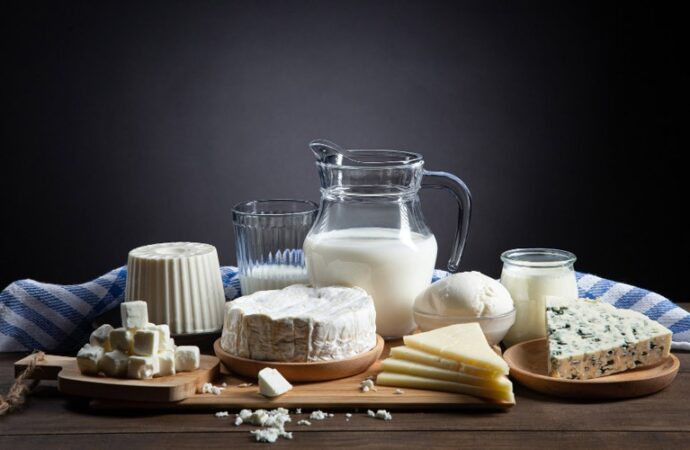Dairy foods provide a wide range of essential nutrients, including calcium, complete protein, vitamin D, phosphorus, vitamin A, riboflavin, vitamin B12, pantothenic acid, niacin, zinc, selenium, iodine, and potassium. An 8-ounce glass of milk alone delivers 8 grams of protein, which supports muscle buildup and strength. Regardless of the type of dairy milk you prefer,
Dairy foods provide a wide range of essential nutrients, including calcium, complete protein, vitamin D, phosphorus, vitamin A, riboflavin, vitamin B12, pantothenic acid, niacin, zinc, selenium, iodine, and potassium.
An 8-ounce glass of milk alone delivers 8 grams of protein, which supports muscle buildup and strength.
Regardless of the type of dairy milk you prefer, whether it’s whole, low-fat, or fat-free, it still provides the same 13 key nutrients, including protein, calcium, and vitamin D.
Is Dairy Healthy or Unhealthy?
While opinions may differ, consider dairy a nutritional powerhouse. Dairy items contribute significantly to a balanced diet. They deliver a broad spectrum of essential nutrients that support overall health. Whether it’s milk, cheese, yogurt, or butter, dairy stands out as a flexible and beneficial food category.
In this article, we’ll break down what dairy really is and explore the health benefits of dairy in your meals.
What is Dairy?
Dairy includes a group of food items made from the milk of cows. Among them, milk stands out as the most widely consumed dairy product. It delivers a natural balance of proteins, carbs, healthy fats, vitamins, and minerals—making it a nourishing option for people of all ages.
- Cheese is a solid dairy item produced by curdling milk proteins. It is available in a variety of textures and flavors. It’s a staple in many cuisines, adding depth and richness to countless recipes.
- Yogurt is created by fermenting milk with beneficial live cultures. It is known for its creamy texture. It also supports digestive health due to the presence of probiotic content.
- Butter, made by churning cream or milk, is a common ingredient in baking and cooking. It’s prized for its smooth texture and ability to enhance the flavor of dishes.
Dairy production involves careful handling to ensure both quality and safety. It begins with milking healthy cows and collecting fresh milk, which is then pasteurized to eliminate harmful bacteria, homogenized to maintain consistency, and often fortified to enhance its nutrient profile. Farmers play a crucial role in this process, ensuring their cows are well cared for, as healthy animals produce high-quality dairy.
Health Benefits Of Dairy
Dairy products, like low-fat or skim milk, yogurt, and cheese, play a crucial role in maintaining a proper diet. Including these items as part of a varied and balanced diet helps supply the body with vital nutrients. These nutrients support digestive health, strengthen the immune system, and contribute to overall well-being.
Energy
Dairy foods are a convenient way to help sustain energy throughout the day. Milk, cheese, and yogurt supply high-quality protein, providing all the essential amino acids that the body can’t produce on its own. This complete protein helps control appetite and promotes a longer feeling of fullness.
One of the key benefits of milk for athletes and fitness lovers is its ability to support the three essential aspects of post-workout recovery: rebuilding muscle, replenishing energy, and rehydrating the body. Research continues to highlight the value of higher-protein diets not just for performance and recovery but also for effective weight management and healthy aging.
Gut Health
Dairy products, especially those that are fermented, play a valuable role in supporting digestive health. Fermented foods have played an integral role in human diets for thousands of years and are produced through the action of beneficial microbes. This natural process not only improves flavor and texture but can also boost how easily the body digests the food and absorbs its nutrients.
Some fermented dairy foods, such as yogurt and various types of cheese, contain live cultures. These active bacteria may help introduce good microbes to the digestive system, supporting a balanced gut environment and enhancing digestion and gut lining function. However, not all fermented foods retain live cultures after processing, so their impact can vary.
Probiotic-rich dairy foods, such as yogurt and kefir, provide additional digestive benefits. These foods contribute to a healthy gut microbiome and may support overall digestive comfort and immune function.
Immunity
Incorporating dairy products into a well-balanced diet is a practical way to fuel your body with essential nutrients that help maintain a robust immune system. Milk delivers key vitamins and minerals, such as A, D, B12, selenium, zinc, and high-quality protein, all of which play a role in supporting immune defense. Similarly, cheese and yogurt supply protein, selenium, and B12, while yogurt also provides a good dose of zinc, making these dairy options valuable additions to your daily meals.
Calming
Research consistently shows that protein tends to be more filling than an equal amount of fat or carbohydrates. This increased sense of fullness can promote better relaxation, which may support more restful sleep. Additionally, the protein in dairy helps in muscle recovery during sleep. It is particularly beneficial for people who exercise regularly or engage in physical activity.
Affordability
Getting the nutrients your body needs doesn’t have to be expensive. Milk offers 13 essential nutrients at a cost-effective price. When it comes to balancing cost and health benefits, dairy stands out as a smart and economical choice.



















Leave a Comment
Your email address will not be published. Required fields are marked with *